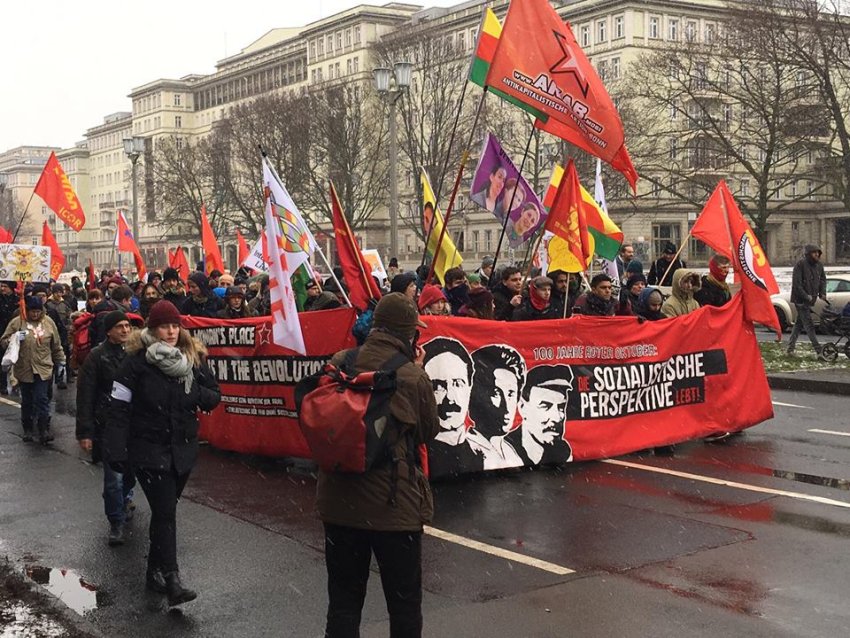
Dedicated to the legendary Polish-born socialist revolutionary and anti-war activist executed for her role in the 1919 German Revolution, the 22nd International “Rosa Luxemburg Conference” took place in Berlin on January 14.
The annual conference has become an annual gathering of revolutionaries, activists, academics, freedom fighters and politicians of the left.
Over 2,800 guests, were present at the event organised by the socialist daily newspaper Junge Welt (“Young World”), and more than 30 supporting organisations.
Taking place at the time of the rise of the far-right across Europe and the Americas, the main message of the conference was: “To be against the right-wing is not enough. Fight for socialist alternatives!”.
International guests from Brazil, the Basque Country, United States, Kurdistan, Cuba, Colombia and others gave reports and speeches about struggles in their countries.
Ertugal Kurkcü, a representative of the Kurdish People’s Democratic Party (HDP), spoke at the conference on behalf of the leader of the party, Selahattin Demirtaş, who was imprisoned by the Turkish government since early November 2016.
“In Turkey and in Kurdistan we see the struggle [against fascism] of the 21st century.”
“Repression against the Kurdish and the anti-Erdogan movement has been reaching its peak, with 40,000 put in jail and tortured, while over 120,000 have been removed from their positions in the civil service and the government.”
“Alongside that we also see a movement in the streets in Turkey and Kurdistan that rejects fascism”
Kurkcü said the HDP follows “the example of Karl Liebknecht and Rosa Luxemburg, who defended the Armenian people in the Ottoman Empire and supported the socialist cause in Russia”
He also read out a short statement from Demirtaş, which called for the left and anti-fascit forces in Turkey and around the world to unite in the face of fundamentalism and police repression.
Jean Wyllys, a member of the Brazilian Congress for the Socialism and Liberty Party (PSOL) and a long-time LGBTI activist, spoke about the struggle of various social movements to survive the post-coup repression that followed the unjust impeachment of President Dilma Rouseff. Being the only elected LGBTI member of congress, he also spoke of the growing level of homophobia, pushed forward by the powerful elements of the Brazilian evangelical church.
Left-wing Basque independence leader Arnaldo Otegi was able to address the conference for the first time as a free person, after more than six years jailed by the Spanish state. While a large part of his talk was dedicated to the question of Basque nationalism and independence, he also explained the significance of taking control of political institutions by the left-wing political forces.
“We pursue independence, not nationalism. The workers are at the heart of the independence movement. That is the essence of the Abertzale left.”
“We, the Basque people, wish to live in a dignified state, one that guarantees dignified life. We wish to construct a society that looks totally different to the one we see today. The left needs to come together on the European and global scale, in a world forum.”
Marylin Zuniga, an educator, community organiser and activist from Black Lives Matter in California, spoke about he importance of organising the anti-racism struggle in the classroom, whilst at the same time supporting the movement against police repression of Black and Latino communities. A large part of her talk was dedicated to the ongoing campaign to liberate Mumia Abu-Jamal, a Black Panther Party member, journalist and writer who has been imprisoned on death row in US jails for more than 35 years after being framed for the murder of a police officer in 1981.
Gian Paolo “Picchio” Picchiami and David Cacchione of the communist punk-rock band Banda Bassotti spoke about their experiences in supporting the anti-fascist struggle in the Donbass region of eastern Ukraine, as well as their ongoing efforts to support Basque political prisoners.
“In Donbass, it is the workers who are on the frontline of a cruel struggle against fascism. Among those we met was Mozgovoi, the commander who was assassinated last year in a bomb attack.”
“The people dying [in Donbass] are dying for us as well. The least we could do is visit them and show our support for their cause”
Rolf Becker, a long-time Jewish anti-fascist activist and actor discussed the difficult question of opposing the actions of Israel towards Palestinians, at the same time as living with the history of the Holocaust and the persecution of Jews in Germany.
Arlín Alberty Loflore, the Assistant director of the Cuban newspaper Granma, addressed the conference on behalf of the Cuban people. Paying homage to the late leader of the Revolution, Fidel Castro, she mentioned how, despite his passing, the words “I am Fidel” are being spoken by the supporters of Cuba right around the world, from Havana to Berlin. She also emphasised the continuous socialist character of the Cuban revolution, with the country’s means of production remaining firmly in public hands, whilst simultaneously acknowledging that that the Caribbean island needed to find new ways of improving its economy.
The conference was followed by a thousands-strong march to the memorial park and cemetery of “zur Gedenkstätte der Sozialisten” to commemorate the 98th anniversary of the assassinations of Luxembourg and Liebknecht. The graves of the two revolutionaries were covered with clavels and roses, as people from around the world paid their respects to the founders of the German Communist Party (KPD).
The fate of Rosa Luxemburg in particular serves as an important reminder as to what could happen to a revolutionary movement if it faces defeat and isolation.
Having been captured, tortured and executed by the right-wing paramilitaries of the Freikorps on the orders of the reformist Social Democratic government of Germany, Rosa’s crime was her support for the failed uprising that sought to reverse the betrayal of the German working class at hands of the SPD, and to place the working class in the leadership of the German Revolution.